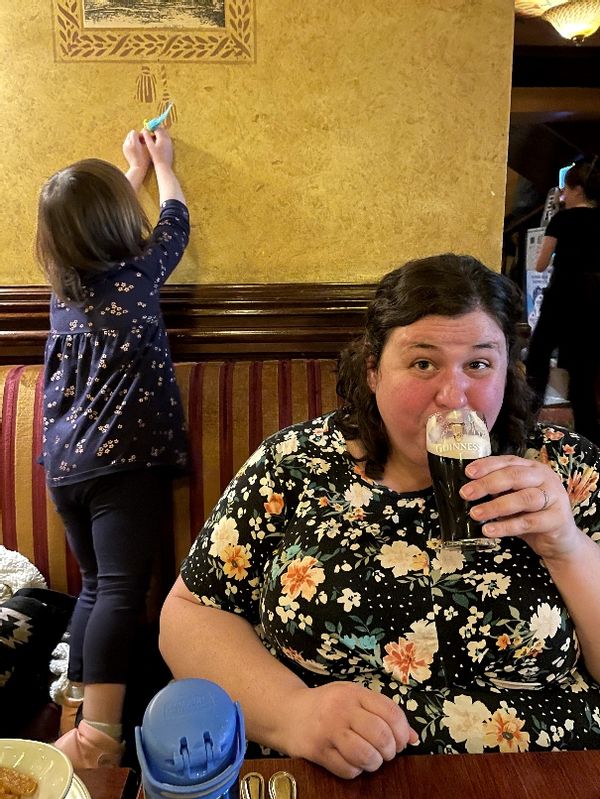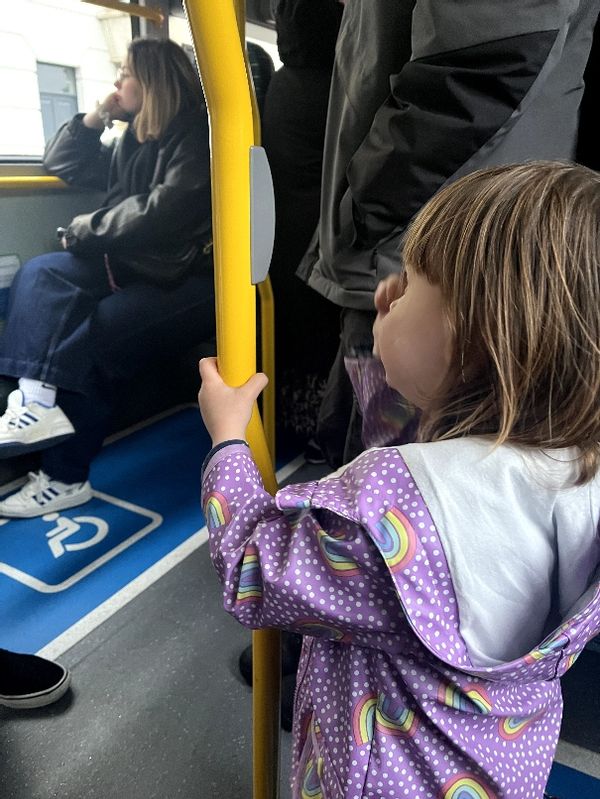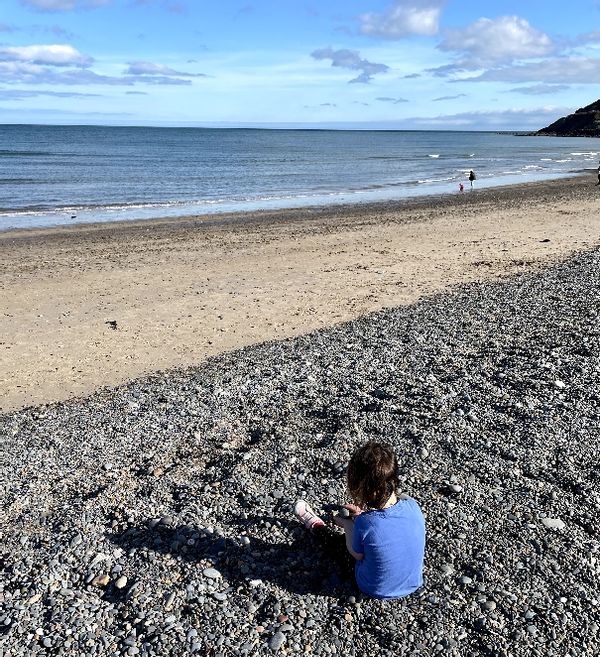“Car seat or booster?”
When the kind, patient English-speaking taxi dispatcher outside Berlin Brandenberg Airport asked me this, I was shocked into momentary silence. Was he offering what I thought he was?
“A car seat,” I said, daring to hope. A minute or so later a large van pulled up, with an age-appropriate car seat ready to go for my 3-year-old daughter, Evie, who was as giddy to see it as I was. It was simple to buckle us all in and head to our hotel, no need for me to clamber into the cab and bump my head on the ceiling while installing the awkward, difficult and outrageously expensive travel seat currently strapped to my back in a giant carrying case. The process can take up to five minutes, requires both the strength of a dozen bodybuilders to pull the seat belt tight enough and a great deal of patience, which I no longer possessed. It was Day 12 of a 16-day trip to Europe for my Philadelphia-based, American family, and suffice to say I was exhausted. This beautiful, wonderful taxi dispatcher had taken a literal load off my back.
We drove happily to our apartment-style hotel, in which I was able to book a two-room family suite for the price I’d spend on a single in the U.S. The pull-out couch in the living room was already made up for Evie, one more item checked off the mom to-do list without me having to lift a finger.
Any parent who walks through American society with tiny humans in tow can tell you that children are simply not welcome in public here.
When we toured the Berlin Wall the next day, no one even noticed the bored toddler playing with the gravel as my husband and I read the historical placards and took photos. Then we only had to walk a few minutes to find a crowded and exciting playground, passing ice cream shops, kids’ activity gyms and preschools along our way through central Berlin. At lunch our waiter giggled good-humoredly at Evie’s order of the “fishy bagel with no fish” and later that night at a rowdy Bavarian brauhaus for dinner, none of the drinkers minded when she took to the dance floor as the polka band blasted out a banger.
he author’s daughter Evie at the Berlin Wall. (Photo courtesy of Kelly Lawler)
By toddler standards, I doubt she could have had a better day. By parenting standards, I couldn’t have had a better experience either. Because just 24 hours into our stay in Berlin, my daughter had already become part of a community. I’m still searching for that sense of belonging back home.
“Children should be seen and not heard”
Any parent who walks through American society with tiny humans in tow can tell you that children are simply not welcome in public here. It’s something you don’t notice until you look for it, or until you have to return an Amazon package and everyone else in line at the UPS store is dead silent and radiating annoyance while your kid can’t stop chattering away. And it’s not just vibes I’m talking about. It’s blatant anti-child policies and aggressive adults in public spaces: breweries and restaurants that post “kid-free” notices during the childcare-strapped week between Christmas and New Years; malls that ban teenagers during after school hours; or even wedding invite after wedding invite that asks parents to exclude their children from a family celebration.
Kids don’t need to be loud, having a tantrum or actively causing disruption to be shunned; they just have to exist outside our prescribed child spaces. Just ask the museum security guard who once physically pushed my daughter back when she was at least five feet away from breaking a “please don’t touch” rule while she explored the art on the institution’s ostensible “family day.” Kids have naturally boisterous, curious and unfiltered personalities that clash with a populace of a country conditioned to repress emotions at all costs.
Sometimes I get so worried about what other people think I realize I’m parenting for the outside world, not for what’s best for my kid.
It doesn’t take long on the internet to find social media posts shaming parents for bringing kids to a restaurant or decreeing that dogs are preferable in public to children. And just as many parents begging the rest of the world to see that kids actually belong out there.
In the three-plus years I’ve been a mother, this lack of welcome means I’ve said “no” more than I’ve said “yes.” I can’t go to your out-of-town wedding if I can’t afford a sitter and my daughter isn’t invited. I no longer have long-lingering dinners at restaurants. I drive everywhere instead of bringing a stroller on public transit where it won’t fit. Sometimes I get so worried about what other people think I realize I’m parenting for the outside world, not for what’s best for my kid.
American society, especially the current political ruling class, claims to be “family first,” but we are a culture that is deeply hostile to children and families. We are one of the only developed countries lacking a federal paid family leave policy, and the price of childcare and other cost-of-living essentials is skyrocketing. There is a pervasive, unspoken agreement in our country that children should be seen and not heard, and actually better off not seen, either. Don’t bring your kids out to dinner. Don’t bring them when you run errands. Don’t bring them to the festival or party or any of the best parts of life. And as a parent, it is demoralizing, exhausting and deeply saddening to feel this hatred.
Family-friendly Europe may as well have been Disney World
 The author’s daughter Evie and the author herself at pub in Dublin. (Photo courtesy of Kelly Lawler)Berlin was our third stop on a trip to see friends and family that also took us to London, Dublin and the Irish seaside. All of our destinations were deeply accommodating to a traveling family. All the European airports had family lines at customs and even security that helped our cranky toddler make it through these tiresome exercises quickly. On our British Airways flight from London to Dublin my daughter and every other child on board were handed cute activity packs with pint-sized sleeping masks and coloring pages.
The author’s daughter Evie and the author herself at pub in Dublin. (Photo courtesy of Kelly Lawler)Berlin was our third stop on a trip to see friends and family that also took us to London, Dublin and the Irish seaside. All of our destinations were deeply accommodating to a traveling family. All the European airports had family lines at customs and even security that helped our cranky toddler make it through these tiresome exercises quickly. On our British Airways flight from London to Dublin my daughter and every other child on board were handed cute activity packs with pint-sized sleeping masks and coloring pages.
Nearly every city bus we went on had designated stroller spaces (or “pram” or “buggies” as the Brits and Irish call them) next to priority seating and wheelchair corners. Major museums nearly always had kid-friendly spaces and activities, divvied up by age, right next to all the grown up art and history. All but the fanciest of restaurants we dined at had kids menus and crayons at the ready. Berlin even has designated kindercafes, restaurants with toys and games ready to entertain littles while the parents can enjoy a nice cup of coffee.
We are a culture that is deeply hostile to children and families.
And it wasn’t just the infrastructure that was so accommodating, but the attitude as well. On all those buses we took crisscrossing metropolises from one tourist attraction to another, Evie ran up and down the aisles and talked loudly about her desire to push the stop button. To my utter surprise as I moved to shush her, I seemed to be the only one who cared; no one looked up from their phones to spit a nasty comment our way. When we called ahead to that fancy restaurant to ask if we could bring a toddler, they told us “of course” and were so kind and sweet throughout our meal, even when she complained and threw her napkins on the floor. At the local fish and chips shop we went to one night in London, the cashier handed her a plate of free chips when she got fussy and hungry during the long wait for our order. It’s almost as if they had an innate understanding of the how and why of little kid actions. She wasn’t being a bad kid; she was just hungry and tired.
And while I can spend a day running errands with my daughter in Philadelphia without spotting someone else under the age of 18, she was far from the only little munchkin running around these cities. Families with kids of all ages were just out doing whatever they needed to do, on commuter trains and busy sidewalks and at the pub on weekdays and weekends. The kids were not intruding on the scene; they were part of the regular cast.
One more way to stress out American parents
Walking into a world where my daughter got to participate in the exploration and excitement as much as I did was a welcome shock. A relief. An unclenching. It wasn’t until I got to relax my shoulders and let her sing made up songs on a crowded train that I realized just how stressful all my interactions with the wider world have been since the day she was born.
Those interactions haunt me, little itching social anxiety spirals that color my cautious lifestyle. I remember the time she had a public meltdown, perhaps the greatest fear of any American parent, in the grocery store. While she was lying prone in the pasta aisle and screaming about who-knows-what, old lady after old lady passed by sneering at my Millennial-style gentle parenting scripts as I tried to calm her down. No ma’am, I didn’t need help, thanks so much.
I also remember the waiter who couldn’t stop staring the first time I nursed in public, and the logistical and financial nightmare of obtaining and installing a travel car seat for a single Uber ride from the rehearsal to the rehearsal dinner for my sister-in-law’s wedding. I remember the time I brought Evie to urgent care and I let her watch TV on an iPad after she had been crying for hours in pain, even as I was convinced everyone else in the waiting room was judging me. I remember being shushed for her playful sounds while in the children’s section of the library.
And I ashamedly also remember being 23 and snooty, loudly complaining to my drunk friends about all the strollers that I saw as obstructive and intrusive at the Washington, D.C. Cherry Blossom Festival.
Hating kids means hating much more
 Then author’s daughter on a bus in Dublin. (Photo courtesy of Kelly LawleR)It is not surprising that Americans culturally reject children in public, because we are a society based on the myth of “rugged individualism” and capitalist hegemony: If it’s not for you, it is against you. If they’re not your kid, then they’re in your way.
Then author’s daughter on a bus in Dublin. (Photo courtesy of Kelly LawleR)It is not surprising that Americans culturally reject children in public, because we are a society based on the myth of “rugged individualism” and capitalist hegemony: If it’s not for you, it is against you. If they’re not your kid, then they’re in your way.
But here’s the thing: kids are people too. They’re not just tiny noise machines, they’re whole human beings who deserve to be out and about in the world. They don’t exist just to go to school and return home silently. They don’t act like robots. They need to run and jump and be loud and learn how to keep their cool in line for ice cream by getting out of the house and seeing what the line for ice cream is really like. In only a brief visit I could see that those European cities fundamentally understood this, and without in any way inconveniencing the adults going about their days.
Our rejection of children in public is not without consequences for grown adults. It’s part of a prescriptive, old-fashioned notion of politeness and good manners that deliberately leaves out huge swaths of our population, particularly neurodivergent people, who might make noise and stand out from the crowd. Welcoming children is about being a generally welcoming and inclusive culture. But if you haven’t noticed, “inclusive” is starting to become a dirty (and banned) word in the U.S.
It is very hard to win as a parent, particularly in this country. It’s expensive, time- consuming and deeply exhausting to raise children in modern America, where our disparate population lacks “villages” to rely upon, school shootings hardly make the news anymore and most childcare facilities cost more than local mortgage and rent bills. If you want to go have a nice meal at a restaurant you can shell out hundreds for a babysitter or bring the kids with you and risk the ire of all. Maybe they’ll throw food or have a meltdown and you’ll never be able to return to that restaurant again. Maybe you’ll bring a tablet and they’ll be calm and quiet, but the same people who would have thrown you dirty looks for a rowdy child throw you equally judgmental glares for “letting the iPad babysit them.” There are scarcely any ways to win.
 The author’s daughter on a beach in Bray, Ireland. (Photo courtesy of Kelly Lawlsro)Earlier in our trip we visited the Irish town of Bray, a picturesque Dublin suburb along the Irish Sea. At a restaurant Evie made a friend with a local Irish girl, and the pair decided to climb on a retaining wall in the outdoor seating area, which a waiter quickly told us wasn’t allowed. We stopped them, then headed to a playground. Next, we went to the pebble-stoned beach where Evie delivered hand-selected rocks to a group of teenagers nearby enjoying the unseasonably warm March day. The teens called her adorable, smiled and accepted their presents, then went back to their phones. We got ice cream and stopped for souvenirs and the store owner directed us to the nearest bathroom upon a potty emergency. We took the train back to Dublin, and Evie fell asleep amid the bustling rush hour commuters, and we carried her blissfully unaware and snoring back to our hotel.
The author’s daughter on a beach in Bray, Ireland. (Photo courtesy of Kelly Lawlsro)Earlier in our trip we visited the Irish town of Bray, a picturesque Dublin suburb along the Irish Sea. At a restaurant Evie made a friend with a local Irish girl, and the pair decided to climb on a retaining wall in the outdoor seating area, which a waiter quickly told us wasn’t allowed. We stopped them, then headed to a playground. Next, we went to the pebble-stoned beach where Evie delivered hand-selected rocks to a group of teenagers nearby enjoying the unseasonably warm March day. The teens called her adorable, smiled and accepted their presents, then went back to their phones. We got ice cream and stopped for souvenirs and the store owner directed us to the nearest bathroom upon a potty emergency. We took the train back to Dublin, and Evie fell asleep amid the bustling rush hour commuters, and we carried her blissfully unaware and snoring back to our hotel.
From her three-foot vantage point she interacted with at least a dozen adults that day (well, if you can call the teens adults), all of whom were polite, gentle and helpful even when she broke the rules. We barely spent any time with them, and yet they acted as part of that village everyone tells me I need to raise a kid.
Perhaps I’ve given up on finding that village here after dirty looks and hostile policies, but if I’ve learned anything from this trip it’s that there are people ready to make the world more welcoming to kids, because they’re people too. And honestly if you spend some time with them, by gosh they are so much fun to be around. They are funny and energetic and life-affirming. Even the sullen Irish teenagers knew that.
I only hope that I won’t always have to get on a plane to find a place for us to belong.
Read more
about parenting




























